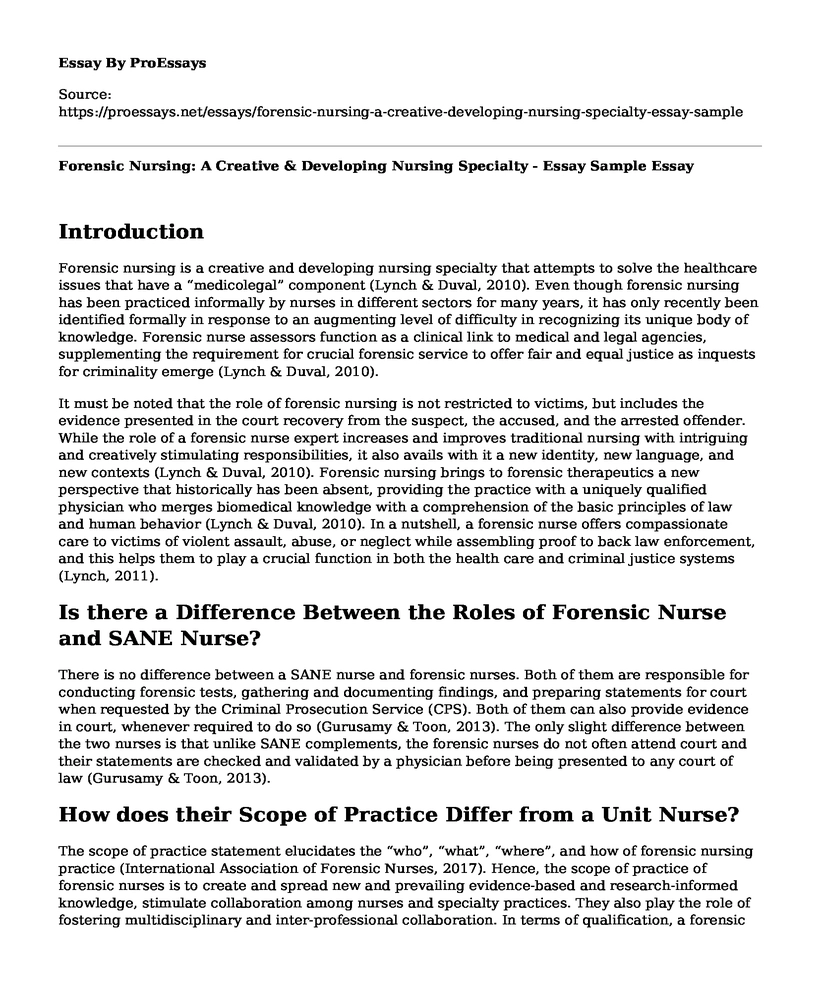Introduction
Forensic nursing is a creative and developing nursing specialty that attempts to solve the healthcare issues that have a “medicolegal” component (Lynch & Duval, 2010). Even though forensic nursing has been practiced informally by nurses in different sectors for many years, it has only recently been identified formally in response to an augmenting level of difficulty in recognizing its unique body of knowledge. Forensic nurse assessors function as a clinical link to medical and legal agencies, supplementing the requirement for crucial forensic service to offer fair and equal justice as inquests for criminality emerge (Lynch & Duval, 2010).
It must be noted that the role of forensic nursing is not restricted to victims, but includes the evidence presented in the court recovery from the suspect, the accused, and the arrested offender. While the role of a forensic nurse expert increases and improves traditional nursing with intriguing and creatively stimulating responsibilities, it also avails with it a new identity, new language, and new contexts (Lynch & Duval, 2010). Forensic nursing brings to forensic therapeutics a new perspective that historically has been absent, providing the practice with a uniquely qualified physician who merges biomedical knowledge with a comprehension of the basic principles of law and human behavior (Lynch & Duval, 2010). In a nutshell, a forensic nurse offers compassionate care to victims of violent assault, abuse, or neglect while assembling proof to back law enforcement, and this helps them to play a crucial function in both the health care and criminal justice systems (Lynch, 2011).
Is there a Difference Between the Roles of Forensic Nurse and SANE Nurse?
There is no difference between a SANE nurse and forensic nurses. Both of them are responsible for conducting forensic tests, gathering and documenting findings, and preparing statements for court when requested by the Criminal Prosecution Service (CPS). Both of them can also provide evidence in court, whenever required to do so (Gurusamy & Toon, 2013). The only slight difference between the two nurses is that unlike SANE complements, the forensic nurses do not often attend court and their statements are checked and validated by a physician before being presented to any court of law (Gurusamy & Toon, 2013).
How does their Scope of Practice Differ from a Unit Nurse?
The scope of practice statement elucidates the “who”, “what”, “where”, and how of forensic nursing practice (International Association of Forensic Nurses, 2017). Hence, the scope of practice of forensic nurses is to create and spread new and prevailing evidence-based and research-informed knowledge, stimulate collaboration among nurses and specialty practices. They also play the role of fostering multidisciplinary and inter-professional collaboration. In terms of qualification, a forensic advanced practice registered nurse (APRN-BC) holds masters or doctorate degrees and are licensed and certified in the practice of their respective roles (International Association of Forensic Nurses, 2017). For example, a SANE would hold a graduate degree at least. An advanced forensic practice registered nurse collaborates with criminal justice and healthcare experts to provide care for, diagnose, treat and provide check-up care for patients with sexual or assault-related injuries (American Nurses Association, 2011). Their scope of practice differs from a unit nurse who only concentrates on the provision of care, diagnose, and treat patients and also extend it to their families.
Provide 3 Questions You Would Like to Ask a Forensic Nurse in Person to Gain Clarity and Knowledge.
First, can nurse students who complete a blended forensic nursing science curriculum incorporating a stimulation intervention display greater knowledge of nursing forensic science than learners who complete a mixed forensic nursing science course integrating an attention control intervention utilizing physical explanation sessions? (Drake, 2014). Second, will nursing learners who finished a mixed nursing science course implementing an encouraging intervention demonstrate improved skill in the application of forensic skills than students who finished a blended forensic nursing science curriculum integrating an attention control intervention improvising face to face content clarification sessions? (Drake, 2014). Third, what is it like working with the law enforcement agencies to validate the proofs on sexual offenses.
References
American Nurses Association. (2011). Recognition of a Nursing Specialty, Approval of a Specialty Nursing Scope of Practice Statement, and Acknowledgement of Specialty Nursing Standards of Practice. Silver Springs, MD: ANA; 2010.
Drake, S. (2014). The impact of an educational intervention on knowledge and competency levels for students enrolled in a forensic nursing science course (Doctoral dissertation).
Gurusamy, K. & Toon, C. (2013). Forensic nurse examiners versus doctors for the forensic examination of rape and sexual assault complaints: A systematic review. https://onlinelibrary.wiley.com/doi/epdf/10.4073/csr.2014.5
International Association of Forensic Nurses. (2017). Forensic Nursing: Scope and Standards of Practice. American Nurses Association. file:///C:/Users/User/Downloads/Forensic+Nursing_+Scope+and+Standards+of+Practice.pdf
Lynch, V. A. (2011). Forensic nursing science: Global strategies in health and justice. Egyptian Journal of Forensic Sciences, 1(2), 69-76. file:///C:/Users/User/Downloads/EJFS3.pdf
Lynch, V. A., & Duval, J. B. (2010). Forensic Nursing Science-E-Book. Elsevier Health Sciences. http://samples.jbpub.com/9780763792008/92008_CH01_Chapter1.pdf
Cite this page
Forensic Nursing: A Creative & Developing Nursing Specialty - Essay Sample. (2023, Aug 27). Retrieved from https://proessays.net/essays/forensic-nursing-a-creative-developing-nursing-specialty-essay-sample
If you are the original author of this essay and no longer wish to have it published on the ProEssays website, please click below to request its removal:
- Differential Diagnosis
- Essay Example on Pathophysiology: Obesity
- Paper Example on Leadership, Management, and Planning in Healthcare
- Policy Training Plan Paper Example
- Essay Sample on Iom Future of Nursing: Improving Health & Leading Change
- Essay on Transient Ischemic Attack: Brain Dysfunction in a Circumscribed Area
- Paper Example on Public Health Crisis: Urgent Action Needed to Restore Environment







